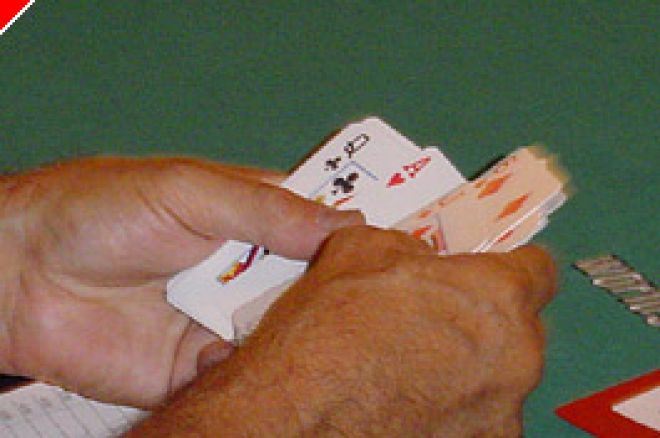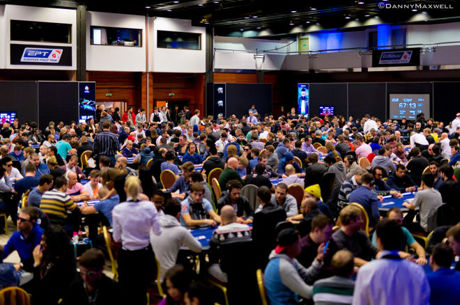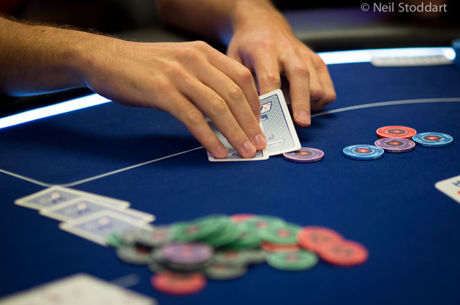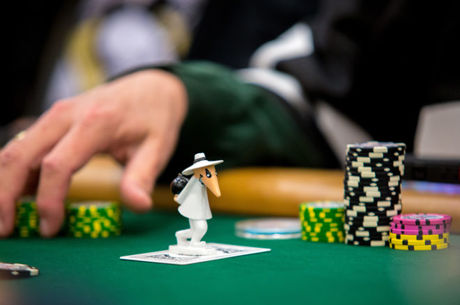Stud Poker Strategy: Fourth and Fifth Street Bluffs

Most of the time, when you're playing a tight/aggressive game, you're going to find yourself raising on Third Street and then continuing to bet on Fourth Street when you figure you still have the best hand. Of course you won't be certain, but if you don't see obvious improvement by your opponents on Fourth then you figure to still be in the lead.
For example, you start with (Kh 4d)Ks and raise the bring in on Third. You get one caller with (x x)Jc. On Fourth Street you get (Kh 4d)Ks 7c and your opponent gets (x x) Jc 4c. You figure you're still high and you continue to bet.
These situations are straightforward. In a loose passive game with a few very bad players who generally call you down to the River, you can just play these types of hands as they develop and stay out of most other pots and you'll finish a winner. It's the basic strategy of stud and it will pretty much assure you of a profit in the low limit and medium limit games with poor players.
However, in games where there are players who are capable of folding to a bet on Fourth Street - or who are otherwise observant and or cautious, you can sometimes bet Fourth Street even when you're not assured of being in the lead. These situations often develop if you attempted unsuccessfully to steal the antes on Third; or when you called with a marginal hand that did not markedly improve. Here are a couple of examples of those types of hands.
You started with (9h 6h)Jh. The tight player to your right called the bring in as did two players after you. One heart is out. On Fourth Street you got the Ks. You saw, beginning to your left:
8d 4c
Qs 6d
Js Qc
(9h 6h)Jh Ks
You are high. What do you do here?
Most of the time you'd check - not wanting to commit money to a pot when you don't have the clear lead. You didn't make a fourth heart. You don't even have a pair. You suspect that at least one of your opponent has a pair. So you don't figure to be in the lead.
Even so, you notice a couple of other things. No one noticeably improved. Since no one raised on Fourth Street you doubt anyone has a premium pair. Maybe the Js Qc is a high hand, but you figure that the J would have raised with a pair of Jacks, and you tend to discount the chances that he has a pair of Queens since you see another Queen out. Also, if you raise, by representing Kings you are representing a hand that is likely to be better than all opponents. You also have some good drawing potential.
Another situation might develop like this.
You started with (3h 3d) Ac. The bring-in was a couple of players to your left. Four players folded to you. So you raised hoping to win the antes. You got one caller with a 9h. The folded cards were: Ks Js Qd Jc 4s 2h.
Now it's fourth street and you get the unhelpful 4c. Your opponent gets the Kd. That card isn't likely to have helped him. If he started with a 3-Straight he'd have to get a two card gut shot (one of the Queens is dead) to make it. He didn't make two open hearts for a four flush if he started with a 3-Flush. And if he started with a pair of 9s then he still has that pair of 9s. Your bet may well knock him out.
It also sets up a good bet on Fifth Street if you each get unhelpful cards. Some players who are unlikely to fold on Fourth - will quickly fold on Fifth when the bets double. They're just committed to their low pair or even their flush or straight draw until they see five cards. So make sure to throw in that bet on Fifth in these situations.
But be cautious. If they spike an Ace and you are sitting with 3s with a King kicker, and then they bet, that's very different from the situation I describe. Similarly, if they catch that second suited card be less inclined to bluff at them on Fourth, as they're likely to just call all the way to the river if they have the four flush.
The texture of the cards that your opponent has can direct your action on Fourth and Fifth Street if you're willing to think about it. Learn not to just automatically bet or call or raise based on your calls and whether or not you judge yourself to be in the lead. Think also about whaty your opponent is likely to have and whether he might be inclined to fold given your board and his likely hand. You'll be able to pick up many pots that way over the long run - and also help to soften what might otherwise be a rocky image.
Ed Note: Lots of great Stud action at Party Poker They don't just play No Limit there!








